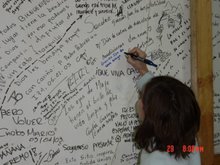I think that rhetoric is a very tricky subject, let alone word to define. For instance, rhetoric mean a lot of different things for many different people. For some, rhetoric takes on a negative connotation. For other people, they realize the use of rhetoric is not only unavoidable, but actually helpful and meaningful, whether giving a speech in front of an audience or simply having a discussing (over the phone or otherwise) with a best friend.
So how did I view rhetoric? I, probably like many of you, saw rhetoric as something negative. When asked what rhetoric is, I usually think of the statement that a kid in my class always used to say, "That's just empty rhetoric." To me, before reading any of articles discussing what rhetoric was, I thought it was simply the use of persuasion and words/speech to make other (maybe less intelligent or easily swayed members of the public) change their mind and join the bandwagon. Although I thought that rhetoric may, in fact, be useful (i.e. if you were a politician, lawyer, etc.) it is not, necessarily, good.
But after the readings, I realize that this is not the full story. Although rhetoric is very much involved in the use of persuasion, it can also be defined as the study of effective speaking and writing (Silva Rhetoricae). The same source also states that fundamentally, rhetoric not only involves perceiving how language is at work, but also how one becomes proficient in applying rhetoric (or effective speaking and writing) in their everyday functions.
Furthermore, to understand rhetoric, a point must be made to make a distinction between form and content or between what's said and how one says it. Yet, this difference between form and content is not always easy to distinguish between, because it is said to be "artificial and conditional." As Aristotle put it, it's the difference between logos or logical content of a speech and lexis or the style and delivery (Silva Rhetoricae). It's so important now to understand what rhetoric is, because the forms of communicating with each other are always changing.
Finally, today's readings have also changed my perception of the use of rhetoric-it's not just "empty talk." Rhetoric is used everyday, whether we know we are using it or not. Not only do we plan it, but we also adapt it to the audience that present it to. For instance, me writing in this blog to the members of the class. Furthermore, as stated by James A. Herrick in The History and Theory of Rhetoric: An Introduction, rhetoric can also reveal human motives (such as a professor's true feelings on an issue) and provokes response from an audience. Thus, rhetoric (as stated by Herrick) not only tests ideas, but also assists advocacy, addresses contingent issues, distributes power, discovers facts, shapes knowledge, and finally builds community. Thus, rhetoric can be a very useful tool to not only find the truth, but to allow the truth to be known and acted upon. Rhetoric, in fact, can be a good thing.
Thus, my definition of rhetoric, since the readings, has changed. Rhetoric is something that we, as individuals who communicate with one another in any way, use everyday. It is not necessarily negative or "empty speech" nor is it necessarily always good. Rhetoric is used in the formal as well as the informal settings and has a new-found importance today, simply because of all the new forms of communication that we have. Rhetoric is the use of certain symbols (language, writing, signs) to convey what one means effectively.
Subscribe to:
Post Comments (Atom)


1 comment:
Hey! I noticed you said that from the readings you realized that rhetoric is effective in speaking and writing. Do you agree with Herrick that rhetoric is also present in art, music, and even dance? I was kind of skeptical when I heard this so I was just wondering your thoughts on it.
Post a Comment